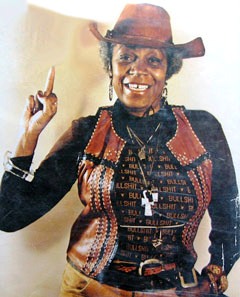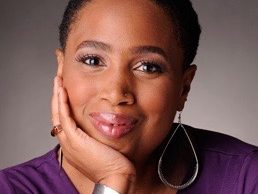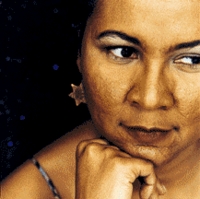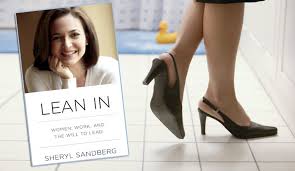Feminists We Love: Caroline Clay
Caroline Clay is an actor with a stunningly expansive resume. She is a vibrant teaching artist and vocal coach, who envisions theater as personally empowering and socially transformative. She recently completed an MFA at the University of Maryland, too. But in all of her ventures, she is invested in “celebrat[ing] unsung warrior women of color.”
She’s also caught the attention of Gloria Steinem. In her solo performance Let It Flo, Clay recovers and celebrates legendary, unique, and yet sometimes forgotten feminist Florynce Kennedy.
Heather: How did you find Flo Kennedy? Of any feminist icon to explore, why her?
Caroline: Flo Kennedy found me. I was watching the extraordinary HBO documentary, Gloria Steinem: In Her Own Words and there was this grainy 1970’s archival footage. You see Gloria at the podium in the midst of a speaking engagement and then out of nowhere, you hear a florid barrage of expletives just out of camera shot. The camera turns to reveal this petite woman with a salt and pepper afro, long nails, false eyelashes, and fabulous clothes tussling with two white security guards twice her size. To this day, I am unclear as to the nature of the conflict and why Florynce was cursing them out. It was like watching a human volcano. All I could think was, “Who the hell is that and why don’t I know her?”
I hit the computer and found out it was she who popularized the saying: “If men could get pregnant, honey, abortion would be a sacrament!” It had been told to her and Gloria by a female cab driver. Thus began a two-year journey of research, writing, and performance practice: all in pursuit of learning all I could about the extraordinary Flo Kennedy.
Heather: TFW Editorial Collective member Aishah Shahidah Simmons received an email from Gloria Steinem who saw your performance at a recent visit to the University of Maryland. She was so excited to remember Flo Kennedy through your work. Did she share any stories with you that you had not encountered, or did meeting her change how you envision and embody Flo Kennedy?
Caroline: This entire experience has been a collision of factors that have intersected in ways that I could have never anticipated. From picking up the telephone over a year ago at my desk at the University of Maryland where I was a graduate student and calling Flo’s sister Faye Walton Kennedy, Flo’s gorgeous octogenarian sister who lives in Honolulu. I had not factored in the time change and called her at 5 am. After being lovingly admonished in a cadence that only a Kennedy woman can serve up, we proceeded to chat for three hours. Her generosity and lack of suspicion disarmed me. Had I been the first person ever to call inquiring about Flo? That was impossible.
Faye Kennedy is accomplished in her own right: a renowned author, political activist, and organizer who continues to this day to be one of Barack Obama’s most valued point people on the island. A woman, who after a career as corrections officer pushed racial boundaries by moving with her white husband to Hawaii, an island fraught with its own caste and race issues where she has been a community fixture ever since. Faye shared stories from the Kennedy childhood, not just about Flo but about their beloved parents Zella and Wiley.
Faye then connected with the other surviving sister Joy Kennedy of New Jersey, a composer, author and former model who at the time was embroiled in a huge property rights case fighting tooth and nail for the right to stay in her home. Together with her sister, Joy organized a campaign called “Justice For Joy.” I share this because the legacy of social justice and fearlessness in the face of racism, segregation, and intolerance is in the blood of this family. Their father met the Ku Klux Klan in the light of day on the steps of his home in St. Louis with a rifle in his hand and told them, “First one steps over my threshold gets shot.” The Klan never returned. Here was a man, who worked as a pullman porter on the railroads and then as a taxicab stand owner in the early 20th century. He was a black business owner who taught his daughters never to take shit off of anybody. The seeds of Flo’s so-called “radicalism” were sown early. I prefer to call it common sense.
That Flo’s sisters have trusted me with her story is a gift beyond description. And there is still so much research to do. My next step is to go to Harvard’s Schlesinger Library where Flo’s Papers (1911-2000) are housed along with over 800 hours of VHS recording of the New York public access Flo Kennedy Show. When Flo died, her family was understandably protective over her legacy, and there was tension amongst parts of her family, so much so that there were two funerals. As a researcher and artist, that conflict is neither my interest nor my business, my charge is to make sure that the name Flo Kennedy makes its way back into the academic mainstream of Women’s Studies, Gender Studies, and African American Studies.
During my show, more than one white person asked me, “Was Flo a real person, or did you make her up?” What!?! I thought that was not only offensive but absurd. Why would I have to make Flo Kennedy up? Is it so hard to believe that a Columbia educated attorney with her own law firm (one of the first African American women to graduate from the Columbia Law School), who negotiated the estates of everyone from Charlie Parker to Billie Holliday, who served on the defense team of Andy Warhol shooter Valerie Solanas, who was at the forefront of gender politics and reproductive rights, who sued the Catholic Church, who founded the Black Feminist Party, who wrote books, who acted in movies, and who had a flawless sense of fashion existed? I suppose for some that is hard to believe. For me, she was just a black woman unapologetically living her truth and taking full advantage of her freedoms.
At the end of my show Gloria jumped up and walked to the stage. I burst into tears. It had taken so much to get her there. The fact she was even there was an act of graciousness on so many levels. She was lecturing later that evening at the university for another organization but had agreed to come in earlier on the train just for this show. My entire department, along with the Dean of the Arts and Humanities Dr. Bonnie Dill, who introduced me to Gloria and served on my Thesis Committee, came together to make the afternoon happen. I could not have done the remount of Let It Flo! without my director, Dr. Walter Dallas, who has been my mentor since the age of 18.
At Dr. Dallas’ urging, I made some revisions to the script to include Gloria, which was a delicious risk that thankfully paid off. In short, we meet a physically ill Flo on the last night of her life. She has escaped a senior living facility with staff security in hot pursuit. She makes the decision to reunite with her ancestors on her own terms—she throws a party. In a series of recollections and flashbacks, Flo shares anecdotes and parts of speeches, as she slips into memories. Not all of the memories are good. When speaking of her departure from the National Organization of Women (NOW), Flo remarks,
I stayed as long as I could until it just got too goddamn tame for me. Women were actually having meetings about whether to use white cabbage or red cabbage for coleslaw. Honey, it was only a matter of time. Gloria and I however, managed to stay connected even beyond my departure because Gloria understood that issues of racism and sexism were parallel to those of caste, and personal liberties, and that if we as women: regardless of race didn’t get it together and start telling the truth about….(Flo sees Gloria in the audience and puts on her glasses to get a better look.) Gloria? I rarely put these on… Gloria, is that you? Are they after you too? I thought you might come. Who are we kidding? Gloria heard “party” and got on the first train!
At the end of the show, Gloria stood up and walked towards me, it was an out of body experience. There was this feminist icon, one of my idols, standing there not looking a day over 40 in a black skintight jumpsuit with her arms open wide and tears in her eyes. “Thank you for giving me back Flo! Thank you for giving me back my friend,” she said. Gloria’s generosity has been invaluable. Gloria has helped clarify dates, locales, people, and resources. She shared that while on the road during their speaking engagements, Flo used to turn the heat up unbearably hot in their hotel room. To some, that is an inconsequential detail. To an actor, it’s gold! Gloria is also determined that I get the right kind of cowboy hat for Flo. These stories really show the sisterhood and caring between Flo and Gloria. I am an intermediary, a conduit really to something much bigger than myself. I am the child of two 60’s children who came out of the civil rights movement and the war on poverty. I was raised around an awareness of service. My medium may be acting but the goal is always to be of service.
Heather: The ideas of community engagement and civic discourse permeate your work. What role does performance art play in effecting social change? What does performance art offer to feminism in 2013?
Caroline: Great question. To the extent that community engagement creates a landscape where artists and audiences are co-creators in creative experiences, I am excited about its potentiality. I do believe acting is a craft. Not everyone can do it and those who are called to are healers in a society. I think we must take very seriously the role of social media, the twitterverse, Facebook, and all the possibilities that these platforms can provide too. They cannot however, substitute for content. I see a lot of sound, fury and graphics with certain theatre companies that amounts to very little.
What do you have to say? What are you willing to die for? How high are the stakes for you? If they ain’t high for you, why should I care?
Use what you have! Nobody was clamoring for Let It Flo! I pushed for it, and because of the support of an outstanding team, it got remounted. Never underestimate the power of charm and a solid product. You don’t always have to stomp your feet and scream and yell to get what you want. I was so struck by how soft-spoken Gloria Steinem was. She is by no means shy, but she is not bombastic. What makes her so appealing is that she is genuinely available and possesses a core calmness that invites you to lean in. You must lean in and listen. Claim your space in life and onstage. Don’t be afraid of the silences, let them breathe, seduce, and do their work.
For young feminists I think 2013 offers a myriad of opportunities and possibilities that simply don’t look like what our mothers and fathers thought of as theatre. Spoken word at coffee houses, site-specific work, mixed media pieces involving dancers, actors and text, or perhaps a “Sunday Afternoon Salon” and staged reading of new work at a friend’s house or apartment. Some of these require money and fundraising, which has also been revolutionized online, but most of them require just a deep desire to communicate and be authentic with your message. I reject the passivity of the traditional theatrical model—the lights dim, cell phones turned off, sitting in the dark waiting to “respond to” something. That’s assuming you can stay awake. There’s so much boring crap out here now. After its over, lights up. If there’s a talkback, hopefully an enlightened dramaturg or facilitator will get you to consider something you hadn’t about what you just witnessed, or not. Do you leave moved? Do you leave a better person? Or do you go home, pay the sitter and complain about ticket prices?
Heather: Who is doing performance that leaves us a better person? Where can we turn to get inspired?
Caroline: There are so many!!!! Robbie McCauley and her work with Urban Bush Women, Anna Deveare Smith (Fires in the Mirror), Cheryl Dunye (Watermelon Woman), playwright Kia Corthron, and the current work of directors Leah Gardiner and Jennifer Nelson. These women have parlayed their interests in theatre, storytelling, facilitation, and education into hotbeds of creation. Dr. Ysaye Barnwell (member of Sweet Honey in the Rock) and her recent work on a show called Fortunes Bones, which combined her expertise in anthropology, ancestry, and musicology. Anu Yadav, a feminist solo performer and facilitator who is exploring what it means to be both South Asian and from the Midwest in in her piece Meena’s Dream. My greatest inspiration will always be, however, African American actress Franchelle Stewart Dorn. She was a company member with Washington, D.C.’s Shakespeare Theatre for decades; and went on to head the acting program at University of Texas, Austin. There is a moment, if you’re lucky, when you encounter that which you know you know you can be, and for me it was seeing Fran brilliantly play role after role in the classical canon. By merely pursuing her passion, she was telling this black girl from D.C., “Yes, you can do this too.”
Heather: In your mission statement, you identify yourself as a vocal coach particularly attuned to intonation and dialect. The idea of “voice” operates metaphorically throughout feminism to reference agency, self-determination, and politicization. What is the connection to our physical voices and the idea of voice?
Caroline: I teach young women ages 18 to 26, and it is amazing that so much gender messages and oppression have crept in. What were free open voices filled with determination and assuredness are now Marilyn Monroe “little girl” breathy sighs punctuated with upspoken question marks at the end of every thought. Expressions of ideas are so laden with “like” and “you know” that I often have to say, “Stop. Close your eyes. Breathe from the belly. Start again.” They are at a place where they are learning or have learned that to get what they want they have to “craft” a vocal tone. We all do it, men and women, but as women its more insidious and we must, as sisters, hold one another lovingly accountable. Simple things such as grounding yourself on two feet when you speak, making eye contact, breathing from your belly. Listening with your lips parted to truly receive what is being said.
My mentor, Leigh Wilson Smiley, is a Linklater designated voice teacher whose pedagogy emphasizes the spine and the breath/thought connection. I am particularly drawn to the narratives that are revealed through women’s hips and pelvis. If there is sexual trauma or any type of disconnect with the reproductive region, I find it manifests in the voice immediately. If a woman has tight hips or a tight jaw, I know her body has compensated by housing those tensions and redirecting that rage, fear and anguish into the voice. Every month when I have menstrual cramps, my vocal resonances are never more alive and pliant because I am connected to something very primitive and true. I try to the extent that I can in an undergraduate theatre program to encourage young women to be intensely curious about themselves, their bodies, who they are, and who they are in relationship to those around them. To free ourselves, we must free our bodies but on our own terms and in our own time. The media has done such a job of violating women’s sense of balance. What is pretty? What is thin? What is successful? What is smart? What is desirable? What is straight? What is youth? What is race? What do men want? No wonder women are often struck silent.
I struggle myself with voice that I move through the world with in order to survive, and the true voice that reveals the vulnerabilities of my emotional state and desires. To the extent that one can strike a balance and move toward a free instrument is a lifelong journey of practice: filled with meditation, self-awareness, and a conscious decision to reside in a place of joy. Joy is a choice and one that we as women often do not feel worthy of making, having, or basking in.
I tell my students that joy aligned with intent is the ultimate act of the revolutionary. It takes no courage to be snide, nasty, and sarcastic. It does however, take the strength of lions to do as my 11 year old niece does. She has lost her hair for the third time from the chemotherapy associated with her leukemia treatments, but she stands up in the face of all the media bull about “beauty and hair” and wraps her head in colorful turbans and baseball caps, gets on her bike, skateboard, or horse (from Make A Wish Foundation), and smiles with her head up high. That’s feminism. Self-love through example. Other girls see that and want to emulate her.
Curiously, race seems not to affect voice in the same way it did when I was growing up. The girls I hung around growing up in D.C. were downright boisterous (which is another pathology). You could hear us two streets over before we appeared. Yet now, my African American, female students are just as vocally shut down as the white students. I grew up with seven aunts from Birmingham, Alabama. My mother is an English teacher from Louisville, Kentucky. The women in my family are larger than life—big voices, big personalities, claiming the spaces they occupy. My heart breaks when I see my young nieces deal with “mean girl bullying” and fighting to be heard. As women we must continue to reach out to our young girl. We must remember how hard it is to grow up, we must reach out and mentor our young women and our young men. You are necessary. You are needed. You are required!
Heather: Perhaps Flo Kennedy’s most durable legacy remains her insistence that “If men could get pregnant, abortion would be a sacrament.” In the last year, we saw male politicians make horrifying and patently untrue claims about women’s bodies, which brought to the forefront the problems with men having disproportionate political power. From your perspective, what other experiences would be sacraments if our political leadership was dominated by women, specifically feminist women?
Caroline: Graduating from the University of Maryland, College Park, a state school that still has deeply entrenched pockets of racism I encountered tenured white male professors on search committees who, when I speak about the “jaw-dropping racial homogeny among certain faculties” look at me and say, “Whaddya mean?” I don’t know how this can still happen in 2013, but I do know that with more feminists in charge, awareness around the issues of equanimity, equality, and the nature of community could be brought into the forefront.
Flo Kennedy was a feminist. As was 19th century sculptress Edmonia Lewis, and 1940’s cartoonist Jackie Ormes. Yet these aren’t the first names you think of when running through the feminist canon. I have created one woman shows on Flo and Edmonia, and am currently writing a piece on the life of Jackie Ormes. These are women of color. They are unsung. As women, we must bond within academia, in the streets, in the theatres, everywhere and make sure that women like these are on the list.
For more information about Caroline Clay, visit carolineclay.com.





4 Comments